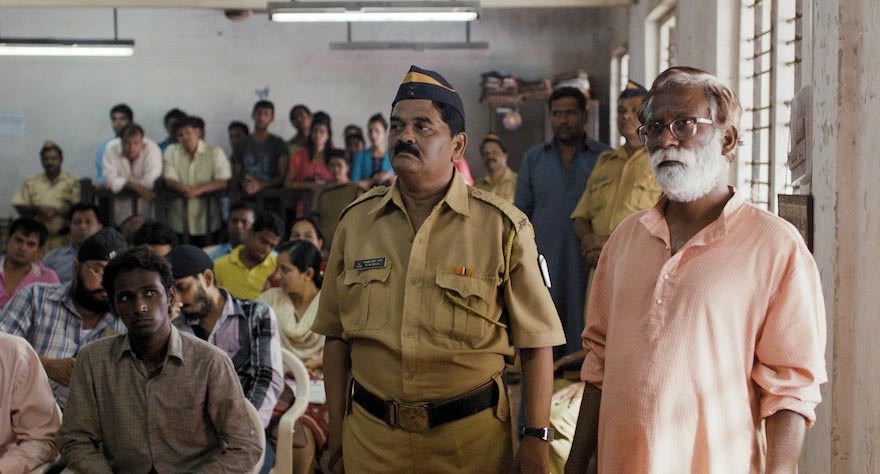
Chaitanya Tamhane's directorial début is an awkward, amusing takedown of India's inefficient legal system.

Chaitanya Tamhane's directorial début is an awkward, amusing takedown of India's inefficient legal system.
A common refrain implies that all lawyers are destined for hell; Court seems to insist they are caught in purgatory. After elderly folk singer and political organizer Narayan Kamble (Vira Sathidar) gets arrested on frivolous charges of abetting the suicide of a sewage worker, his lawyer Vinay Vora (Vivek Gomber) endures a litany of hearings and delays while attempting to free his client. Vinay’s shrewdness as a defense attorney is matched against an obstinate judicial system that values archaic colonial law over logic and reason. Patience with these frustrating proceedings might be Vinay’s greatest professional attribute, but he often displays more patience than Court earns.
During a lecture in which Vinay details the procedural obstacles that continually stall Narayan’s right to due process, a pair of workers intrudes to install a rotating fan. Vinay’s life is full of these interruptions: a series of wry, absurdist hindrances that neither facilitates justice nor advance Narayan’s case: a public prosecutor (Geetanjali Kulkarni) cites decency laws penned in the mid-1800s by the British India era’s Indian Penal Code, the judge (Pradeep Joshi) throws a case out because of a female defendant’s sleeveless top, and a key witness fails to appear in court for the first months of the hearing, causing more postponements.
Like Narayan’s legal case, there are times when Court looks as if it may never end. The bone-dry judicial humor in combination with cinematographer Mrinal Desai’s static camera means scene after scene of sleepy Indian legalese spoken in stuffy courtrooms. The tedium of these scenes seems to be writer/director Chaitanya Tamhane’s clever overarching point. The filmmaker depicts a legal system that appears comically stagnant. Everyone in this film is a victim of an outdated process that actively eschews empathy and common sense.
Life continues unperturbed by the legal battles that occupy Court’s characters. Desai shoots from a distance, often from above and the back of a room, which can occasionally feel like surveillance footage. Each shot is layered with texture. Even in the midst of the crux of Vinay’s arguments, it’s impossible to not notice the throngs of Indians waiting their turn with the judge. There’s constant activity within the frame, and it’s only in a couple of rare moments that Court lingers on a single character. All the exasperated faces planted in front of brightly painted walls provides an effective microcosm of the film.
Tamhane illustrates the remove with which many of these legal workers operate through tangential sections following his characters in their time outside the courts. The segmented nature of these breaks stalls what little momentum Court carries through its story; however, they provide rich detail that allows a more immersive experience into this foreign world. Tamhane has gathered an excellent cast, mixing professional and non-professional actors that play everything straight. Vivek Gomber, in particular, demonstrates a keen understanding for the deadpan delights Court’s script offers, while also navigating mouthfuls of legal rhetoric. Folk singer Vira Sathidar makes for a compelling screen presence, even though his character doesn’t speak much. The two songs performed by his character are evocative, poetic highlights to the movie.
Court serves as a mostly amusing indictment of a corrupt practice plagued by inefficiencies and indifference, thought it would be a stretch to call the movie outright funny. A story built to resemble the maddening system it portrays becomes more difficult to engage with by the limited surface pleasures the film offers. While Chaitanya Tamhane shapes the story with a myriad of caste, political, and socioeconomic issues, outsiders may struggle to identify many of these aspects; yet, his movie reflects universal truths beyond India’s penal issues. Court is an impressively complex début, particularly from a 28-year-old filmmaker. The fascinatingly bizarre case Tamhane constructs is a vehicle for his dry and sometimes dull takedown of Indian justice.
Court is now playing in a limited theatrical release.